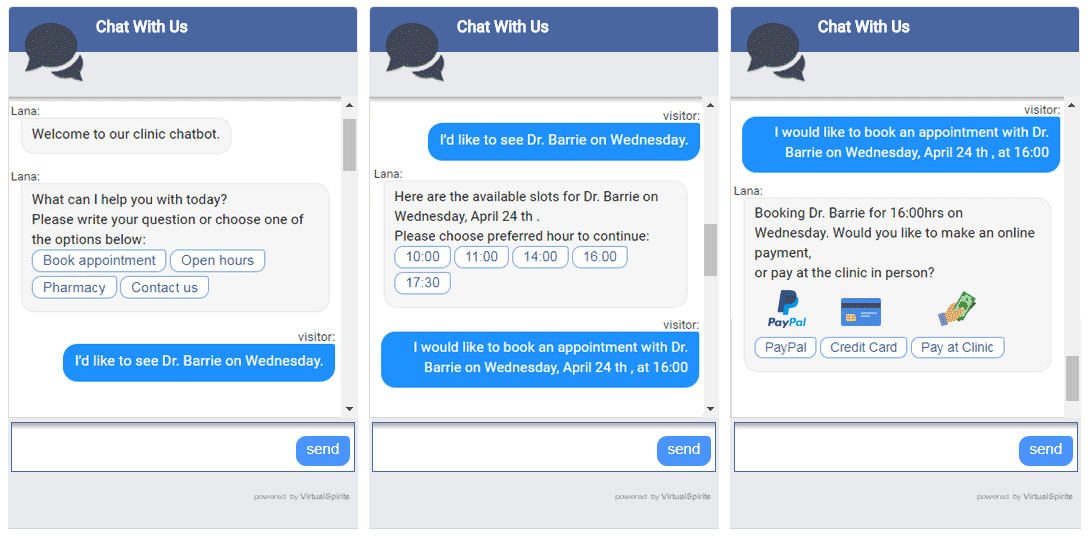
TOPICS:
Chatbot for Healthcare Building a chatbot
Medical chatbots: Healthcare is a serious business, how can chatbots help?
Chatbots and healthcare, really?
A lot of us tend to be skeptical when we hear mentions of AI bots in the context of medical practices and healthcare. Which is only natural, considering that healthcare is a serious business, with very little room for experimentation. But medical professionals are aware of the unique advantages that medical chatbots bring to healthcare. Let’s look at some of them.

Chatbots delivering results when time is of the essence:
Life-and-death situations are common in the world of medicine, and quick and accurate diagnosis is the only way to successfully navigate them. Doctors, paramedics, and other healthcare professionals will be able to take the right call at the right time, if they have uninterrupted access to patient information. Chatbots can help with this.
Numerous modern medical institutions are choosing to create a medical chatbot for internal record-keeping purposes. These bots can instantly retrieve vital information about a patient – details of prescribed and administered drugs, allergies, side-effects, check-up reports, and so on. By building chatbots to pull out this information, hospitals, clinics, and other healthcare practices minimize the amount of time doctors and medical staff would otherwise need to spend clicking their way through a patient record system. And needless to say, online chatbots are able to perform these tasks much faster than human staff, and entail no risks of human error.
Building patient trust with medical chatbots:
Every modern medical practice needs an effective online presence to attract leads and keep its appointments booked. The only catch is that patients might not feel altogether comfortable reading a bunch of webpages about medical conditions, and making appointments without any assistance.
But what happens when a clinic’s website has an online chatbot that talks to its visitors? Let’s look at how a patient named Sarah feels about that.
Sarah wants to see a doctor about the temperature she’s been running for the past couple of days. She has also been developing frequent headaches, and isn’t sure if the two are related. While searching for information about her symptoms, she discovers the website of a clinic near her location. She expects to find pages of information about various medical conditions, and a separate appointment booking system. But instead, a chat window opens up.
Chatbot:
“Hello, and welcome to [Clinic XYZ]! How can I help you feel better today?”Sarah receives options like ‘make an appointment’, ‘check your symptoms’, and ‘emergency medical help’. She chooses ‘check your symptoms’.
Chatbot:
“Our free symptom checker will show you the most probable causes of your symptoms. We’ll also match you with one of our doctors, with whom you can make an appointment. To proceed, please follow the steps below to help me understand your symptoms.”Sarah proceeds to answer simple questions like:
“How long have you had these symptoms?”“Do you have any allergies that you’re aware of?”“Are you on any medications at the moment?”“How would you rate your discomfort on a scale of 1 to 5, 5 being the most severe?”By the end of the questionnaire, Sarah knows what her condition is likely to be, and has the option of seeing a doctor at the clinic the very next day. The personalized interaction with the medical chatbot helps Sarah trust the clinic. This is very much like being attended to by a friendly and helpful nurse or doctor’s assistant, except that it’s much faster, and even more convenient because the patient doesn’t even need to visit the clinic or hospital for it.
Chatbots scheduling appointments:
As we just saw in Sarah’s example, building medical chatbots for medical websites is a great way to start interacting with potential patients. These chatbots are particularly effective when it comes to scheduling appointments. Patients can book a session with a doctor in a matter of seconds, from the comfort of their homes, or even while they’re at work. The best chatbots for healthcare practices are also programmed to match patients with the right specialists, and keep track of all their appointments and follow-ups for future access.
All it takes for someone to make an appointment with their doctor is a simple request typed into a chat window:
Patient:
“I’d like to see Dr. Barrie on Wednesday.” Chatbot:
“Sure. Dr. Barrie is available at 10:00hrs, 11:30hrs, and 16:00hrs on Wednesday. Which time slot would you prefer?”Patient:
“16:00.”Chatbot:
“Got it. Booking Dr. Barrie for 16:00hrs on Wednesday. Would you like to make an online payment, or pay at the clinic in person?”Patient:
“Pay at the clinic.”Chatbot:
“Sure. Appointment booked, your ID is [ID number]. Thank you and feel better!”Chatbots providing support and additional information:
Since medical chatbot development has caught on, healthcare practices have been able to offer an all-round experience to their patrons, covering everything from symptom checking to appointment booking to handling follow-up questions. Patients can get their follow-up questions answered by the online chatbot, and no longer need to call up the clinic for a simple piece of information. The best chatbots for healthcare practices can address doubts and queries like:
“I’ve been prescribed [Drug A], but I’m not sure what it’s for.”“What are your clinic’s timings on weekends?”“How do I contact my doctor?”“Where can I get my wheelchair serviced?”In short, healthcare practices that create a medical chatbot for their websites, reduce the number of repetitive support calls that their employees and staff need to take. This in turn allows their staff to focus on more important tasks, leading to a better-managed healthcare system.
Have questions about healthcare chatbot development? Contact us right here.